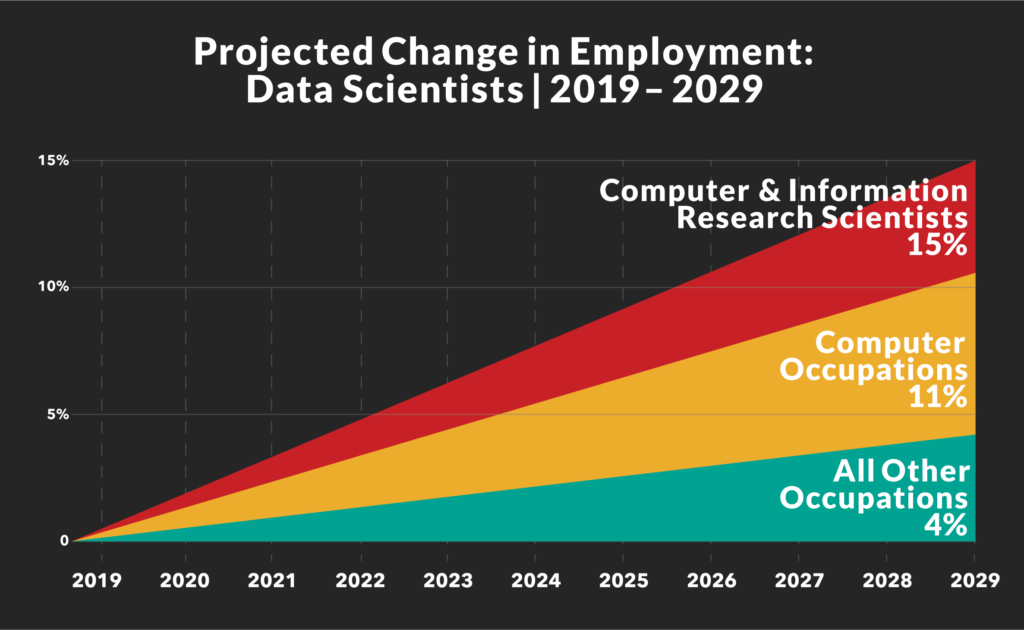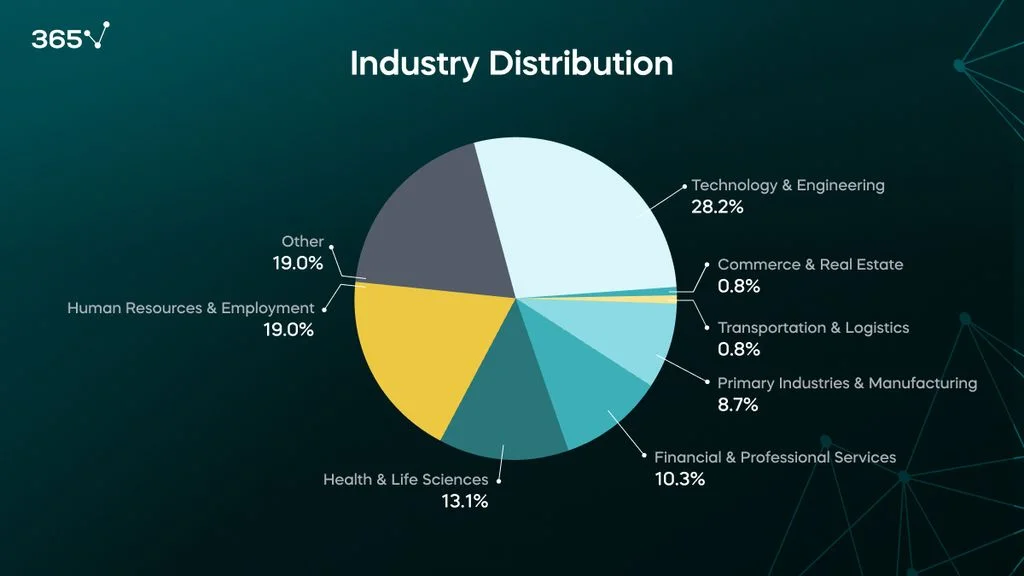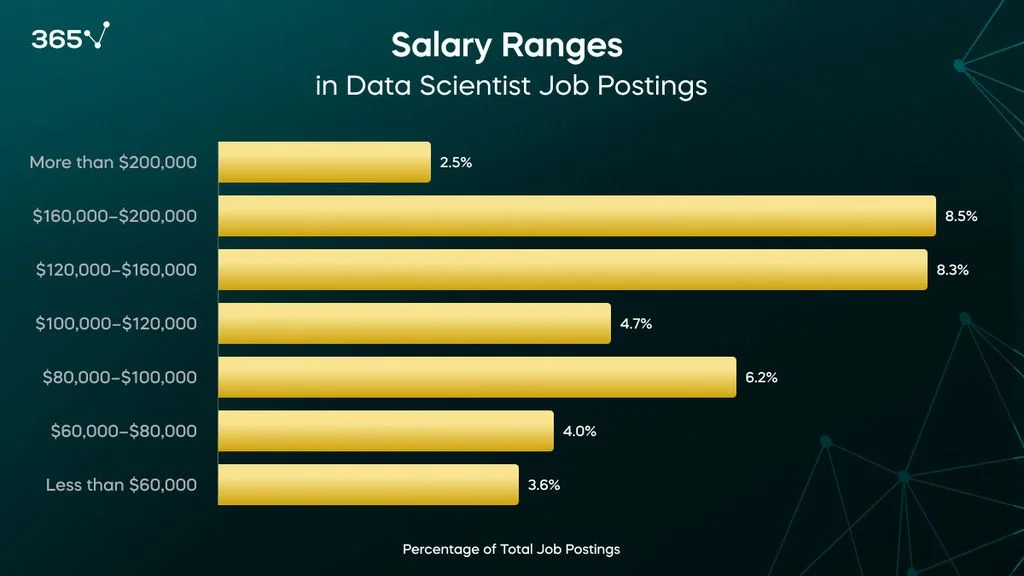
Table of Contents
What Exactly is Data Science?
Data science jobs are everywhere these days! Chances are, someone in your family or among your friends is already working in this field. You collect and analyze huge amounts of information (data) to find patterns and trends that help make smarter decisions.
For example, think about Netflix recommending movies based on your past watches. That’s data science in action—Netflix uses data to predict what you might like!
It’s the science behind understanding data, predicting future outcomes, and making decisions that can improve everything from business strategies to health care treatments.
But Netflix is just the beginning. Think of Spotify, which curates personalized playlists, or how Amazon suggests your desired products. Even Google Maps uses data science to estimate the fastest route by analyzing real-time traffic data.
Why Should You Care About Data Science?
Data science shapes our world in ways you probably didn’t even realize. Here’s why you should care:
- High Demand for Data Skills: From big companies like Google and Amazon to healthcare systems and financial institutions, companies are desperate for data experts who can turn massive amounts of data into meaningful insights. This demand means high-paying jobs and plenty of room for growth.
- Career Flexibility: Data science is used in nearly every field. In healthcare, it helps doctors predict patient outcomes. In marketing, as mentioned earlier, companies like Netflix use it to recommend shows based on your watching habits. In sports, it’s behind how teams improve performance through analytics. Whatever industry interests you, data science skills will get you there.
- Driving Innovation: AI-powered personal assistants like Siri and Alexa, or self-driving cars, data science is at the core of the latest tech innovations. If you want to be part of the future, data science will get you there.
- Making an Impact: Beyond tech, data science is solving problems in the actual world. For example, it’s helping researchers predict natural disasters, optimize traffic systems, and even track the spread of diseases like COVID-19. It’s a career where your work could literally save lives.
What Skills Do You Need to Succeed in Data Science?
1. Programming Languages
- What It Is: These are essential tools for sorting, analyzing, and managing large datasets (often called “big data”).
- Key Languages:
- Python: Widely used for its simplicity and versatility; perfect for beginners.
- R: Excellent for statistical analysis and data visualization.
- SAS: Useful in data analytics and advanced analytics.
- SQL: Essential for managing and querying databases.
- Why It Matters: Understanding these languages allows you to manipulate and analyze data efficiently.
- Where to Start:
- Online Courses: Platforms like Coursera, edX, or Codecademy offer beginner-friendly courses in Python and R.
- Books: “Automate the Boring Stuff with Python” is great for beginners.
2. Statistics and Probability
- What It Is: The foundation of data science, helping you write effective machine learning models and algorithms.
- Key Concepts:
- Linear Regression: A statistical method for predicting the relationship between variables.
- Probability Distributions: Help understand how likely different outcomes are.
- Mean, Median, Mode: Basic statistics to summarize data.
- Why It Matters: Mastering these concepts helps you interpret data and make informed decisions.
- Where to Start:
- Online Courses: Websites like Khan Academy and Coursera offer introductory courses in statistics.
- Books: “Statistics for Data Science” has practical insights.
3. Data Wrangling and Database Management
- What It Is: The process of cleaning and organizing complex datasets to make them easier to analyze.
- Key Tools:
- Data Wrangling Tools: Altair, Talend, Alteryx, Trifacta, Tamr.
- Database Management Tools: MySQL, MongoDB, Oracle.
- Why It Matters: Effective data wrangling ensures you’re working with accurate and relevant data, critical for sound analysis.
- Where to Start:
- Online Tutorials: Free resources like W3Schools and tutorials on YouTube can help you learn SQL and data manipulation.
- Courses: Look for courses on data wrangling on platforms like DataCamp.
4. Machine Learning and Deep Learning
- What It Is: Techniques that enable data scientists to make predictions based on data patterns.
- Key Algorithms:
- Linear Regression: For predicting numerical values.
- Logistic Regression: For binary outcomes.
- Decision Trees: For making decisions based on data features.
- Random Forest: An ensemble method for improved accuracy.
- Why It Matters: Knowledge of these techniques allows you to automate predictions and enhance data analysis.
- Where to Start:
- Online Courses: Courses on platforms like Coursera (e.g., Andrew Ng’s Machine Learning course) can provide a solid foundation.
- Books: “Hands-On Machine Learning with Scikit-Learn, Keras, and TensorFlow” is a great resource for practical applications.
5. Data Visualization
- What It Is: The skill of creating visual representations of data to communicate insights effectively.
- Key Tools:
- Tableau: User-friendly software for creating interactive visualizations.
- PowerBI: Microsoft’s tool for business analytics and data visualization.
- Microsoft Excel: Useful for quick charts and graphs.
- Why It Matters: Good visualization skills help you tell a compelling story with your data.
- Where to Start:
- Online Courses: Data visualization courses on platforms like Udemy or LinkedIn Learning can get you started.
- Practice: Use free datasets from Kaggle to create your own visualizations.
6. Cloud Computing
- What It Is: Using cloud services to analyze and visualize data stored online.
- Key Platforms:
- Amazon Web Services (AWS): Provides various cloud computing services.
- Microsoft Azure: Offers cloud solutions for analytics and data storage.
- Google Cloud: Useful for scalable data processing and machine learning.
- Why It Matters: Familiarity with cloud computing is crucial as many companies now rely on cloud technology for data management.
- Where to Start:
- Certifications: Consider beginner certifications from AWS or Google Cloud.
- Free Resources: Both AWS and Google Cloud offer free tiers and tutorials to explore their services.
7. Interpersonal Skills
- What It Is: Soft skills that enable effective communication and collaboration with team members and stakeholders.
- Key Skills:
- Active Listening: Understanding others’ perspectives.
- Effective Communication: Clearly presenting your findings.
- Collaboration: Working well with different teams.
- Public Speaking: Presenting data insights confidently.
- Why It Matters: Strong interpersonal skills are essential for building relationships and ensuring your data-driven insights are understood and acted upon.
- Where to Start:
- Workshops: Participate in communication or public speaking workshops.
- Practice: Join groups like Toastmasters to improve your speaking and leadership skills.
The Job Market for Data Scientists
Currently, the employment market for data scientists is highly promising. The U.S. Bureau of Labor Statistics predicts that data scientist roles will remain one of the fastest-growing careers in 2024.
The Bureau of Labor Statistics predicts a 31% growth in demand for data scientists by 2029, therefore this trend is projected to continue. Data scientists are in high demand across all industries and sectors.
Different companies from industries ranging from healthcare to finance to retail are on the hunt for experienced data scientists who will help them in making data-driven decisions to gain an edge over their competitors.

Which is easy Python or data science?
| Comparison | Python | Data Science |
| Definition | A straightforward programming language that’s easy to read and write. | A diverse field that blends statistics, machine learning, and real-world knowledge. |
| Ease of Learning | Very beginner-friendly; simple syntax makes it easy to pick up. | More complex; involves learning stats, programming, and business concepts. |
| Scope | Focused mainly on coding and software development tasks. | Covers a wide range of skills, including data manipulation and analytics. |
| Tools and Libraries | Includes handy libraries like Pandas and NumPy for data handling and visualization. | Uses various tools like R, SQL, and machine learning libraries (e.g., TensorFlow). |
| Time to Master | Quick to learn; you can start writing scripts and automating tasks fast. | Takes longer to master due to the depth of knowledge required in multiple areas. |
| Problem Solving | Solves coding and algorithm problems. | Tackles real-world issues by analyzing data and providing actionable insights. |
| Application Focus | Versatile; can be used for web development, automation, and more. | Mainly focused on analyzing data to help businesses make the right decisions in various sectors. |
| Career Opportunities | Skills are applicable in many areas like web dev, automation, and software engineering. | Specialized roles include Data Analyst, Data Scientist, and Machine Learning Engineer. |
| Learning Resources | Many beginner-friendly tutorials and courses are available online. | Resources are more specialized and often focus on advanced topics. |
| Mathematical Knowledge | Basic math is usually enough to get started with Python programming. | Requires a strong background in statistics and linear algebra. |
| Overall Difficulty | Large community with lots of helpful documentation and tutorials for all skill levels. | Also has a supportive community, but resources are more advanced and focused on specific areas. |
Is data science as good as CSE?
| Focus | Extracting insights from data using a blend of statistics, computer science, and math. | Designing, developing, and deploying computer systems and software. |
| Core Subjects | Involves statistics, machine learning, data analysis, and big data technologies. | Includes programming, algorithms, computer architecture, and software development. |
| Scope | Focused mainly on coding and software development tasks. | Covers a wide range of skills, including data manipulation and analytics. |
| Career Paths | Data Analyst, Data Scientist, Machine Learning Engineer, Data Engineer. | Software Developer, Systems Engineer, Network Administrator, Cybersecurity Analyst. |
| Skills Required | Proficiency in data manipulation tools (Python, R), statistical methods, machine learning algorithms. | Strong programming skills (Java, C++, Python), software engineering principles, systems architecture. |
| Tools Used | Python, R, SQL, TensorFlow, Hadoop, Tableau for data manipulation and visualization. | C++, Java, Python, Linux, MySQL, and various software development frameworks. |
| Career Potential | Growing field with opportunities in machine learning, artificial intelligence, and analytics. | Strong demand for software development, system design, and IT infrastructure roles. |
| Challenges | Involves solving complex data-related problems, and requires a mix of domain knowledge and technical skills. | Often involves complex coding, debugging, system architecture, and managing large-scale software systems. |
Is data science easy or hard?
A Mix of Fields: Data science blends math, statistics, computer science, and domain knowledge. If you enjoy these areas, it might feel easier!
Skill Requirements: You need solid analytical thinking and problem-solving skills to extract insights from complex data. Some people pick this up quickly, while others may struggle.
Support Makes a Difference: With the right support, like Mockbuddy, learning data science can be much easier! Mockbuddy is your AI study partner that provides customised questions on specific topics, helping you focus on any weak spots.
Varied Perspectives: Some folks find data science concepts intuitive and love the challenge, while others see it as more difficult. It really depends on your background and interests.
Continuous Learning: The field is always evolving, which means you’ll need to keep learning to stay up-to-date with the latest tools and technologies. This can be a challenge, but it’s also exciting!
Mindset is Key: With the right mindset, effort, and dedication to ongoing learning, you can navigate the challenges of data science. So, if you’re motivated, you can make it work!
Types of Data Science Jobs
There are several types of data science jobs you can pursue, depending on your interests and skills. Here are some of the most common roles:
- Data Analyst
Data analysts are in charge of gathering, processing, and analyzing data statistically. They develop reports and visualizations using technologies like Excel and Tableau to assist organizations in making data-driven choices.
In the U.S., the total pay for a Data Analyst is $108,969 per year, with an average annual salary of $84,362.
- Data Scientist
Data scientists utilize data to assist businesses in resolving challenging issues. They are in charge of creating and executing machine learning models and algorithms, and they frequently deal with big data technologies like Hadoop and Spark.
In the U.S., Data Scientists are really “data-mining” their way to the bank, with a total pay of $160,617 a year and an average base salary of $115,496. Who knew playing with data could pay off so well?
- Machine Learning Engineer
Machine learning engineers are responsible for designing, building, and deploying machine learning models in production environments. They work closely with data scientists to turn prototypes into scalable solutions.
Machine Learning Engineers are pulling in $165,982 a year, with an average salary of $121,206. Looks like AI isn’t taking their jobs anytime soon—it’s actually paying them pretty well!
- Big Data Engineer
Big data engineers are in charge of creating and constructing systems that can manage massive volumes of data.
They develop, construct, and maintain data pipelines capable of handling huge volumes of data using technologies such as Hadoop and Spark.
When it comes to managing massive datasets, the bigger the data, the bigger the rewards! Big Data Engineers are earning a solid $127,606 a year, with an average salary of $100,620.

Are data science jobs high paying?
Big Bucks: Data science jobs can pay really well! If you’re a machine learning engineer, you might be looking at $300K or more. Data engineers also do great, with salaries around $200K.
AI is the Answer: Want to hit it big? Aim to be an AI researcher. If you make a name for yourself in that field, you could be pulling in seven figures—that’s over a million!
Starting Out: Just a heads-up—if you’re fresh out of school, you probably won’t start at those big numbers. You need a strong background to land those top-paying gigs right away.
Finance Goldmine: If you get into data science at a hedge fund or asset management firm, you could make between $150K and $250K. And with bonuses, your total could reach $300K to $500K or even more!
Education Counts: To snag these high-paying roles, a solid education is key. A good Master’s in Data Science and some hands-on experience can really help you stand out.
Tough Competition: Remember, lots of people want these jobs, so you’ll need to show what makes you special!

How to Stand Out in Your Data Science Jobs Search
Focus on Business Results, Not Just the Cool Tech
It’s great that you can build advanced models, but companies care more about how your work makes or saves money. When you talk about your projects, focus on the business impact—like how your model increased revenue or reduced costs.
Show Business Metrics Like ARR and Savings
In your resume or portfolio, include results that companies care about, like Annual Recurring Revenue (ARR), Monthly Recurring Revenue (MRR), and cost savings. These are attention-grabbers for hiring managers who want to see how you’ll help their business grow.
Change Your Resume to Each Job
Don’t send the same resume everywhere. Customize it for each job by including keywords from the job description and emphasizing relevant projects. This increases your chances of getting noticed and shortlisted.
Highlight Real-World Project Results
Instead of saying, “I built a model,” talk about the outcomes. For example, mention how your forecast improvements saved the company $1 million or how you increased accuracy by 5%. Real-world value matters more than just listing technical skills.
Follow Up on Project Performance
After you’ve finished a project, find out how it performed in the business over time. Did it generate revenue or save costs? Adding these updates to your resume shows that you care about the long-term success of your work, which makes you stand out.
Blend Tech Skills with Business Smarts
Being technically strong is important, but showing that you understand how your data science work can drive business success is what sets you apart. Make sure to highlight how you help turn models into profitable products or cost-saving solutions.
Keep Your Resume Short and Sweet
Make sure your resume is easy to read and doesn’t drag on longer than 1-2 pages. Hiring managers are busy, so get straight to the point! Focus on your key achievements and the business impact of your work.
Show You’re All About the Bottom Line
Companies want data scientists who can help them make money. Instead of just listing cool projects, say things like, “I help bring products to market that pull in hundreds of millions in revenue.” This shows you’re not just about the tech; you’re all about delivering real value!
Conclusion
Data science jobs are in high demand, and this field provides multiple opportunities for people with the abilities and experience that are required.
You may improve your probability of finding your ideal job in data science by concentrating on building your technical and soft skills, networking with other experts, and being up to current on industry trends.
If you liked this article, you can check out more by clicking here.
Is data science a good career choice?
Yes, data science is considered a highly promising and rewarding career choice. With the increasing importance of data-driven decision-making in various industries, the demand for skilled data scientists continues to grow.
Data science offers opportunities to work on challenging problems, make a significant impact, and enjoy competitive salaries.
What skills are required for to secure a data science job?
A career in data science typically requires a combination of technical and analytical skills. Key skills include programming languages like Python or R, proficiency in statistical analysis, machine learning techniques, data visualization, problem-solving abilities, and strong communication skills. Additionally, domain knowledge in specific industries can also be valuable.
Is it necessary to have a degree in data science to pursue a career in the field?
Having a degree in data science or a related field can be advantageous but it is not always a strict requirement. Many effective data scientists have backgrounds in computer science, mathematics, statistics, engineering, or other quantitative areas. A strong foundation in mathematics, statistics, and programming is typically essential.
What industries can I work in as a data scientist?
Data science jobs are in demand in a number of areas, including technology, finance, healthcare, retail, and marketing. Virtually every sector that deals with data can benefit from the expertise of data scientists. Data science professionals are in high-demand in industries such as e-commerce, telecommunications, and manufacturing.
How do data science salaries compare to other professions?
Data science careers are often associated with competitive salaries. Specific wage ranges, however, might differ depending on criteria such as work experience, location, industry sector, and educational background. Generally, data scientists enjoy attractive compensation due to their specialized skill set and the value they bring to organizations.
What are the career prospects for data science professionals?
Data science specialists have excellent opportunities for advancement. The demand for experienced data scientists is on the rise as more industries adopt data-driven decision-making. Data scientists can find opportunities in roles such as data analysts, machine learning engineers, data engineers, data consultants, and research scientists. Continuous learning, staying updated with emerging technologies, and expanding skill sets can further enhance career growth prospects.
How can I start a career in data science?
Starting a career in data science typically involves acquiring a strong foundation in key concepts and skills. Pursuing relevant educational programs, such as degrees in data science or related fields, or completing online courses and certifications can provide a solid starting point. Additionally, gaining practical experience through internships, personal projects, and participating in data science competitions can help build a portfolio and demonstrate skills to potential employers.



